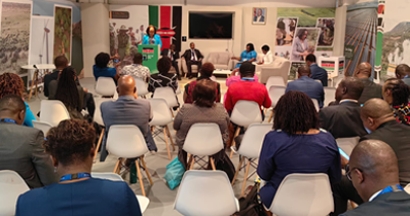President William Ruto has reiterated the government’s commitment to bolster intergovernmental relations to strengthen devolution and work in collaboration with County Governments for enhanced service delivery to all Kenyans.
Speaking while chairing the 10th National and County Governments Coordinating Summit held on 18th December 2023 at State House, Nairobi, the President noted that collaboration between both levels of government is key in driving socio-economic transformation at the grassroots level and advancing the Bottom-Up Economic Transformation Agenda (BETA).
“I believe that our country’s fortunes, to a decisive extent, are dependent on how we manage the devolution of national power and resources,” he said further commending County Governments for their instrumental role in delivering key government programmes such as the subsidised fertiliser programme and affordable housing.
Council of Governors (CoG) Chairperson and Vice Chair of the summit H.E Anne Waiguru on her part emphasized the need for all actors to ensure the realization of resolutions made in previous summit meetings, identify any gaps and collectively develop practical solutions that will stand the test of time.
“The dedication of the two levels of Government to working collaboratively reinforces the spirit of unity and shared responsibility in steering our great nation towards prosperity,” she said.
While it is notable that the National Treasury had for the first time since the advent of devolution, disbursed all allocations to County Governments at the close of the financial year 2022/2023, Governor Waiguru noted the need to expedite disbursement of the arrears to County Governments in line with the disbursement schedule to enable implementation of County budgets.
To this end, the National Treasury has since cleared October 2023 arrears and disbursed to 23 Counties for November 2023 allocations. However, 24 Counties are still owed Ksh.17.48 billion for November and all 47 Counties Ksh.30.83 billion for December 2023 allocations bringing the total amount owed to Counties to Ksh.48.32 billion.
The summit, themed “Enhancing service delivery for sustainable socio-economic development through harmonious intergovernmental relations”, brought together key stakeholders including Deputy President H.E Rigathi Gachagua, Governors, Cabinet Secretaries and other officials. Members present were urged to actively improve intergovernmental consultation and cooperation as an effective mechanism for dispute resolution in order to better serve Kenyans.
Key resolutions arising from the meeting include: the Attorney General shall fast-track the proposed amendments to repeal the provisions of Section 191 A-E of the Public Finance Management Act, 2012 to enable County Governments to access conditional grants without any hindrances; the Attorney General shall seek through parliament, to unlock the stalemate on the County Governments Additional Allocation of Revenue Bill 2023; the National Treasury shall engage with the CoG and respective line Ministries to develop an effective institutional structure for management of conditional grants related to programme support from development partners and; IGRTC shall institute a consultative process bringing together the Kenya National Library Services (KNLS), Nairobi City County and Nakuru County on the three libraries currently under the management of KNLS. s
On matters health, it was agreed that: the National Government’s stipend support towards the Community Health Promoters (CHPs) shall be extended from the current three (3) years to five (5) years; the Ministry of Health (MOH) shall support County Governments with an additional 7809 CHP kits and stipends by the end January 2024 and additionally, develop a framework to necessitate embedding slot online a common pool of resources earmarked for the payment of the CHPs to be managed by the two levels of government.
Concerning the Managed Equipment Service (MES), it was decided that MOH jointly with the CoG, through a select technical committee of seven members drawn from both parties, shall develop a strategic roadmap that shall guide the two levels of government in transitioning from MES without disruption of services. As a stop gap measure, the existing contractual obligations shall be negotiated for extension up to the end of March 2024.
The meeting also resolved as follows: the National Government will allocate a grant of Sh250 million to each of the remaining 29 counties for the implementation of County Aggregation and Industrial Parks (CAIPS) in the Supplementary Budget for the financial year 2023/24; a consultative process shall be instituted involving both levels of governments and Parliament to unlock the existing legislative gaps to necessitate equitable distribution of the Roads Maintenance Levy Fund (RMLF) between the two levels of government; the IGTRC shall comprehensively engage with all the key stakeholders for a further period of two months to ensure the exercise of transfer of functions is completed and pending functions due to the County Governments are gazetted for transfer; the exercise leading to the completion of the valuation of assets shall be fast tracked and completed within the next two months to necessitate the legal transfer of the assets to the County Governments.








